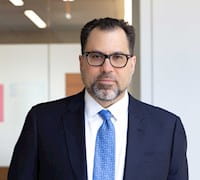We often think of global health as something vast—but Dr. Olufunmilayo Olopade wants us to realize that impacting global health can be a local endeavor. “We need to create new models for reaching the unreached: it doesn’t matter where they are.” This is one of the forces behind her company, CancerIQ, which helps providers use genetic information to prevent cancer across populations in urban and rural settings.

As well as being an entrepreneur, Olopade, is the Walter L. Palmer Distinguished Service Professor of Medicine and Human Genetics, associate dean for global health, and director of the Center for Clinical Cancer Genetics and of the Center for Global Health, all at the University of Chicago. She is also a fellow of the American College of Physicians.
When Olopade was setting up her company, her daughter, then an MBA student at Wharton, suggested that her mother recruit Booth students with a biology background as interns.
“They were able to get the concept so much faster than I could get the business concept,” said Olopade. “I have learned so much from them about how to think about sustainability and business models.” One of the first MBAs that Olopade contacted, Haibo Lu, ’14, would become cofounder and vice president of product at CancerIQ.
Through this experiment, Olopade realized that many health-care scenarios can benefit from someone with business acumen, while most entrepreneurs lack connections to medical expertise.

To help bridge this gap, Olopade and her husband, Dr. Christopher Sola Olopade, professor of medicine, dean for academic affairs in the Division of Biological Sciences and director of international programs at the Pritzker School of Medicine, designed the Winter 2021 Booth course Global Health and Social Policy, which covers topics such as reproductive health, data science, and climate change.
Sola Olopade, who also has a masters degree in public health policy and is a fellow of the American College of Chest Physicians, said global health includes not only improving health outcomes but also opening markets, developing innovation, and using science and technology to address the most important questions of our time. “Look at what the World Economic Forum has been about. This is a long overdue program for Booth students to be exposed to.”
Interdisciplinary collaboration between medicine and business is at the heart of the recently launched Healthcare Initiative at Booth. Codirector Dan Adelman, the Charles I. Clough, Jr. Professor of Operations Management, said the initiative serves as a “hub and spoke” model, a core of support for programs such as his Healthcare Analytics Laboratory and for faculty and students interested the intersection of business and medicine.

“We’re a venue for faculty to share their research results in a centralized place where external constituents can learn about the great work at Booth in the health-care space.”
— Dan Adelman
The initiative provides guidance for faculty and students on navigating the institutional review board process, accessing and interpreting health-care data, interpreting HIPAA regulations, and connecting with experts at UChicago Medicine. It also collaborates with the Booth Healthcare Club. “We’re a venue for faculty to share their research results in a centralized place where external constituents can learn about the great work at Booth in the health-care space,” Adelman said. He noted that this fills a need at the business school. “If you look at our peers, almost all of them have some sort of health-care center or initiative. Health care is 18 percent of GDP, so there’s an interest in developing this space at Booth.”
Ultimately, he hopes the initiative will serve as a business and health-care destination similar to the way Booth’s Kilts Center for Marketing does for that field. “We’ve talked about fellowship programs and mentorship opportunities. We aspire to develop scholarship money and we’d like to bring in residents—not just from our hospital but broadly—who are interested in getting their MBA.”
One of the initiative’s first events, in late 2020, was a virtual conversation between Adelman and Dr. Omar B. Lateef, president and CEO of Rush University Medical Center, in which they discussed how the City of Chicago responded to the COVID-19 epidemic, capacity constraints, PPE price gouging, nursing shortages, and morale and motivation issues.
“It’s important that Booth students take advantage of the fact that we have a superb medical center right on campus and that we teach international differences in health-care systems versus the US health-care system,” Olufunmilayo Olopade said. “It provides an opportunity to have a global education on what health and wellness should be about.”
“Many average Americans do not have health literacy,” she said. “That’s why it’s important to teach this to MBA students. After all, they’ll be creating solutions.”
Booth News & Events to Your Inbox
Stay informed with Booth's newsletter, event notifications, and regular updates featuring faculty research and stories of leadership and impact.
YOUR PRIVACY
We want to demonstrate our commitment to your privacy. Please review Chicago Booth's privacy notice, which provides information explaining how and why we collect particular information when you visit our website.
